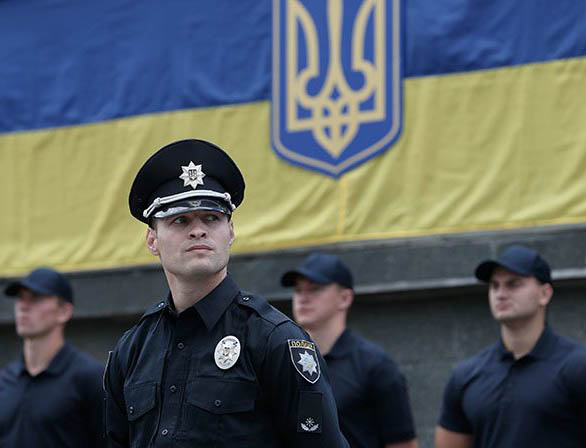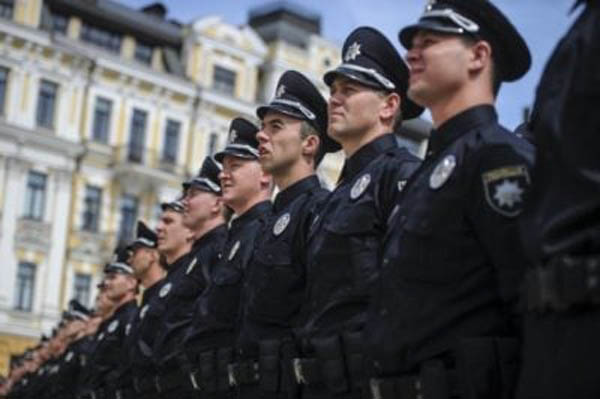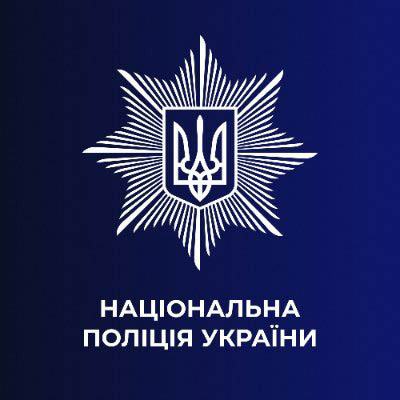National Police of Ukraine
National Police of Ukraine (Національна поліція України or НПУ; Natsionalna politsiia Ukrainy or NPU). Ukraine’s national law enforcement body brought into being in 2015 as part of reforms following the Euromaidan Revolution. NPU replaced militia and the State Automobile Inspectorate (DAI), both systemically lawless and corrupt, and both under control of the Ministry of the Interior. By retaining for over two decades the Soviet-established militia, independent Ukraine had through inertia held onto the law enforcement institution designed by the Soviets to protect the state from its citizens, rather than vice versa. Corruption plagued both the militia and DAI because their officers were underpaid and unsupervised; they were generally distrusted by the public. The post-Euromaidan reforms were intended to replace Soviet-style policing and to restore citizens’ trust with democratic public order police service.
The Law on the National Police defined the NPU’s tasks in part as being to ensure public safety, protect human rights and freedoms, combat crime, and provide assistance to individuals as needed. The keynote was community service. This was a fundamental reorientation of policing in Ukraine. President Petro Poroshenko signed the new law on the NPU in August 2015. In November he appointed as inaugural head of the National Police Khatiia Dekanoidze, part of a team of Georgian reformers assisting the Ukrainian government. Under her leadership the entire force of 115,000 personnel was to undergo reassessment and recertification. The DAI was replaced by a 15,000-strong Patrol Police composed of fresh recruits, male and female with higher education, providing them with new uniforms and fuel-efficient automobiles. Better paid than their predecessors, they were to assure safe streets and roads and to treat citizens with respect. The Patrol Police were separated from the criminal police, the latter being relieved of nonessential tasks such as issuing licenses (an opportunity for corruption). Recruitment into the Patrol Police was by open competition; discipline and promotions decisions would pass from the Minister of Interior to public commissions.
Other legislation demilitarized the Ministry of Interior which housed the NPU, making it into a civil service responsible for public order, fighting crime, administering migration policy, dealing with emergency situations, and safeguarding the security of all citizens. All special forces such as Berkut were to be liquidated and replaced by a single rapid-reaction force (KORD) consisting of 5,000 mostly fresh personnel untainted with the previous regime. However, the demilitarization of the ministry never took effect. Ultimately, reassessment as actually carried out identified only seven percent of personnel as unqualified and liable to dismissal. Of these, one-half upon appeal to the law courts were reinstated. Competitive selection applied only to new entries into the Patrol Police; it was optional for promotion and advancement. Renewal of personnel was limited mostly to the Patrol Police; the bulk of the police establishment was unaffected hence a source of anti-reform sentiment. Non-governmental organizations (NGOs) and civil society organizations (CSOs) were gradually pushed out of the reform process as well as from public oversight commissions replaced by pro-police lobbies.
Dekanoidze resigned a year after her appointment, citing pushback from the police force itself and implying lack of support from Interior Minister Arsen Avakov. She was replaced by Serhii Kniazev, a career police officer and client of Avakov. Police reform had barely begun at that time. In 2018 Kniazev, who favored crime fighting and public safety ahead of reform, announced that applicants who had failed the NPU entrance examination would be given a second opportunity. This would further impede renewal and professionalism in the force. Other signs were equally inauspicious. A report on torture and excessive use of force by the NPU in the previous three years was not mentioned in the NPU annual report for 2018. Nor was the exclusion of CSO activists from the civilian oversight commissions. Throughout 2016–19 the media reported on a series of incidents involving unsolved murders, police brutality, mismanagement, and incompetence, which led to calls for the resignation of both the National Police chief and the Minister of the Interior, but without effect. In September 2019 Kniazev suddenly resigned. Days previously, Kniazev’s ex-wife had been detained at the Polish border attempting to cross with 500,000 Euros in undeclared cash, and she and her companions were charged with money-laundering. Kniazev was replaced by Ihor Klymenko, a deputy head of the NPU.
The European Union Advisory Mission (EUAM) began assisting with security sector reform in 2014. It trained law enforcement officers, including police, judges, prosecutors as well as Security Service of Ukraine officers, and helped with the drafting of legislation. As of 2019 its head of mission gave Ukraine a grade of 7 out of 10. Encouraging improvements had been achieved, according to the EUAM, but legislative processes were still too long and criminal procedures too inefficient. By 2020 the EUAM had significantly contributed to Ukraine’s police reform by helping to draft more than 40 laws and 25 strategic documents, introducing community policing to the work and training of the NPU, eliminating duplication by combining operatives (detectives) and investigators, establishing quick response teams, and providing more than 3 million Euros’ worth of equipment. From the Ukrainian authorities’ perspective, the mission should have been larger and helped to repel the Russian military intrusion into the country’s east. The mission acknowledged that more work was needed to restore Ukrainians’ trust in their law enforcement bodies.
In July 2021, after seven and one-half years in office and years of public calls for his removal, Interior Minister Arsen Avakov resigned, mired in political corruption. He was replaced by Denys Monastyrsky, a close associate of President Volodymyr Zelensky, whose personal direction he promised to follow. Monastyrsky was not expected to advance police reform further having had ties to the discredited Avakov. When Monastyrsky died in a helicopter crash in January 2023, he was replaced by Ihor Klymenko, head of the NPU since 2019, who in turn was replaced by his deputy, Ivan Vyhivsky.
The NPU faced an extraordinary burden in addition to casting off the Soviet legacy immediately upon its formation. It became directly involved in the so-called Anti-Terrorism Operation (ATO), the military campaign of repelling the Russian Federation’s armed incursion into the Donbas in the guise of a civil war. According to the Law on Combatting Terrorism, the NPU was to detect terrorist crimes, provide forces to the Anti-Terrorist Centre, have its chiefs included in central and regional coordinating groups, supply manpower and equipment for operations, and assume responsibility for public safety in the areas of ATO operations. It was also to deal with organized crime groups, safeguard weapons and ammunition storage sites, identify suspicious persons, and guard transportation facilities such as airports and railway stations. On top of all that, the NPU’s cybersecurity departments were to ensure information and cybersecurity. Evidence of treason was collected against organizers of the Donetsk People’s Republic and Luhansk People’s Republic. In April 2018 the ATO was renamed as the Joint Forces Operation, with the NPU being assigned an integral role.
Following the full-scale invasion of Ukraine by the Russian Federation in February 2022 and the imposition of martial law, the NPU was given expanded powers and adopted a wartime mode with new, often grim, duties. These included identifying bodies of thousands of civilians killed by bombings or as a result of war crimes by the invaders, creating a register of as many as 23,000 missing persons, documenting war crimes, launching a register of lawfully owned weapons, seizing illegal weapons and explosives, and intercepting people smuggling or those aiding draft dodgers, and looting—all this in addition to curbing Russian sabotage. A special military police was contemplated in 2024 because the regular police had their hands full.
At the onset of the war the Patrol Police had 16,000 employees. In the combat zone their regular duties were replaced by countering subversion and reconnaissance groups (SRGs), escorting humanitarian convoys, evacuating civilians and assisting with military logistics. Outside the combat zone they continued their patrol duties in cooperation with the military, assisted Territorial Recruitment Centres (TRCs) in locating evaders, and manned roadblocks. Its head, Ivan Vyhivsky, reported in January 2024 that the NPU had 98,000 employees, and was understaffed by 17.5 percent; the Patrol Police were 20 percent understaffed. In conditions of war, street crimes had decreased in Ukraine, but other forms of criminal activity were up.
In 2023 the EUAM adjusted its mandate taking account of the Russian Federation’s war of aggression. It augmented its program of assistance to Ukraine by supporting the country’s capacity to combat organized crime, restore law and order in liberated areas, and, in cooperation with the EU’s own Atrocity Crimes Advisory Group, investigate and prosecute war crimes on a large scale.
According to the Kyiv International Institute of Sociology (KIIS), Ukrainians’ trust in the National Police rose from 30 percent in December 2021 to 37 percent three years later. It had been at 58 percent in December 2022, the first year of the full-scale war. This volatility means that the public’s faith in their new institution of law enforcement may have improved but was not yet stable or substantial. The government of Ukraine and its allies have still more work ahead of them to bring the majority of the Ukrainian public to trust the police, a reasonable threshold to expect in a functioning democracy.
BIBLIOGRAPHY
Harasymiw, B. ‘Policing, Democratization and Political Leadership in Postcommunist Ukraine,’ Canadian Journal of Political Science, 36, no 2 (June 2003)
‘Pro natsional'nu politsiiu,’ Holos Ukraïny (6 August 2015)
Harasymiw, B. ‘Police Reform: Challenges and Prospects,’ in Revolution and War in Contemporary Ukraine: The Challenge of Change, ed O. Bertelsen (Stuttgart 2016)
Sukhov, O. ‘Dekanoidze Says Ukraine Lacks Single-Minded Team of Reforms,’ Kyiv Post (30 December 2016)
Marat, E. The Politics of Police Reform: Society Against the State in Post-Soviet Countries (New York 2018)
Friesendorf, C. ‘Police Reform in Ukraine as Institutional Bricolage,’ Problems of Post-Communism, 66, no 2 (2019)
Abroskin, V. ‘Public Safety Maintaining Bodies of the National Police of Ukraine in the Conditions of the Anti-Terrorist Operation,’ Central and Eastern European Legal Studies, no 2 (2019)
Pehlman, N. ‘Patrimonialism Through Reform: Public Participation in Police Reform, Institutional Capture, and Bureaucratic Capture in Ukraine,’ Harvard Ukrainian Studies, 37, nos 3–4 (2020)
Meszaros, E. L.; Toca, C. V. ‘The EU’s Multifaceted Approach to Resilience in the Eastern Neighbourhood. Security Sector Reform in Ukraine,’ Eastern Journal of European Studies, 11, Special Issue (November 2020)
Poletti, U. ‘How the EU Helps Ukraine Reform Police and Justice,’ Kyiv Post (30 May 2024)
Bohdan Harasymiw
[This article was written in 2025.]



